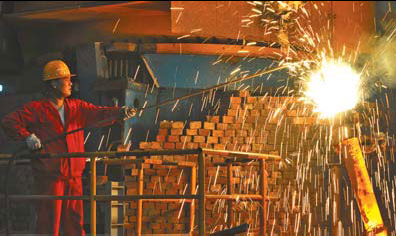Competitiveness ranking sees rare decline for China
Updated: 2012-09-06 07:59
By Fu Jing in Brussels and Wei Tian in Beijing (China Daily)
|
|||||||||||
|
A worker cleans continuous-casting equipment at a Dongbei Special Steel Group Co Ltd plant in Dalian, Liaoning province. Liu Debin / For China Daily |
China's global competitiveness ranking declined for the first time in 2012 after seven years of steady progress.
Experts said the news is a warning to Beijing that it needs to effectively increase education and innovation investment and speed up market-oriented reform.
In the Global Competitiveness Report 2012-13, released on Wednesday, the Switzerland-based World Economic Forum said China's competitiveness ranking dropped from the world's 26th in 2011 to 29th this year, its first decline since 2005.
For the fourth straight year, Switzerland was ranked No 1, and this year, it is followed by Singapore. Hong Kong and Japan are also on the top-10 list.
| ||||
Chi Fulin, president of the China Institute for Reform and Development, said the lower ranking for China this year is largely the result of its economic slowdown since late 2011.
"China's higher rank in previous years was mainly due to its rapid growth, unlike the Scandinavian countries, which gained their competitiveness via comprehensive national strength," Chi said.
But during an interview with Xinhua, Margareta Drzeniek Hanouz, senior economist of the WEF and co-author of the report, said the change of China's ranking is so small that it is hard to interpret right now.
"It's only very tiny decline. China is still doing very well," she said.
The annual report also said China still leads the emerging economies.
Among the 144 economies and regions listed, Brazil was 48th; South Africa, 52nd; India, 59th; and Russia, 67th.
She said the gap between China and the other BRICS countries is going to remain for the time being, while Russia's accession to the World Trade Organization might bring some changes to its ranking in the future.
However, Chi Fulin said that China, facing declining exports and rising costs, is also seeking to transform from the world's largest manufacturer to a leading innovator globally, hoping to translate its high economic growth into overall national strength.
"If the process goes well, China will reclaim its high position on the ranking table," Chi told China Daily.
To that end, Chi said, China needs to shift gears in its growth pattern from one driven by investment and export to a consumption-led one.
The success of this change will depend on reforming social income distribution to release residents' purchasing power, expanding the modern service sector, Chi said.
Last but not least, "the Chinese government needs to rethink its role and give more say to the market", he said, adding that there are experiences to be referred to in other high-ranking Asian countries.
David Fouquet, an expert of the Brussels-based European Institute of Asian Studies, said China's leadership should have a more comprehensive picture than what was described in the report, which is more business-based.
"China should be careful about the criteria in the report, which indicates that the smaller the economy is, the more competitive it will be," said Fouquet, adding that this is an indication that China needs to interpret the results in the report critically.
The report indicated that Switzerland and countries in Northern Europe have been consolidating their strong competitive positions since the economic downturn in 2008.
The US declined in the rankings for the fourth consecutive year, falling two places to seventh. It's overtaken by the Netherlands, which is fifth, and Germany, which is 6th.
"Persisting divides in competitiveness across regions and within regions, particularly in Europe, are at the origin of the turbulence we are experiencing today," said Klaus Schwab, founder and executive chairman of the World Economic Forum.
"We urge governments to act decisively by adopting long-term measures to enhance competitiveness and return the world to a sustainable growth path."
Dennis Pamlin, founder of Sweden-based consultant firm 21st Century Frontiers, said: "For a 21st-century perspective, one must look at how much countries are able to lift people out of poverty and create an economy that can deliver sustainable solutions for 9 billion people. These are areas in which China is pretty advanced. Most of the countries high in the list focus their economy and competitiveness almost exclusively based on their ability to efficiently produce goods and services to the rich part of the world.
"And they do so in an environmentally unsustainable way that ignores the fact that we have only one planet.
"For a country like China, which is so big and has special circumstances, it is better to use a tailor-made approach in which China is compared with other counties in key areas. An index in which peaceful development is the starting point, not almost totally ignored."
Contact the writers at fujing@chinadaily.com.cn and weitian@chinadaily.com.cn
Today's Top News
President Xi confident in recovery from quake
H7N9 update: 104 cases, 21 deaths
Telecom workers restore links
Coal mine blast kills 18 in Jilin
Intl scholarship puts China on the map
More bird flu patients discharged
Gold loses sheen, but still a safe bet
US 'turns blind eye to human rights'
Hot Topics
Lunar probe , China growth forecasts, Emission rules get tougher, China seen through 'colored lens', International board,
Editor's Picks

|

|

|

|

|

|










